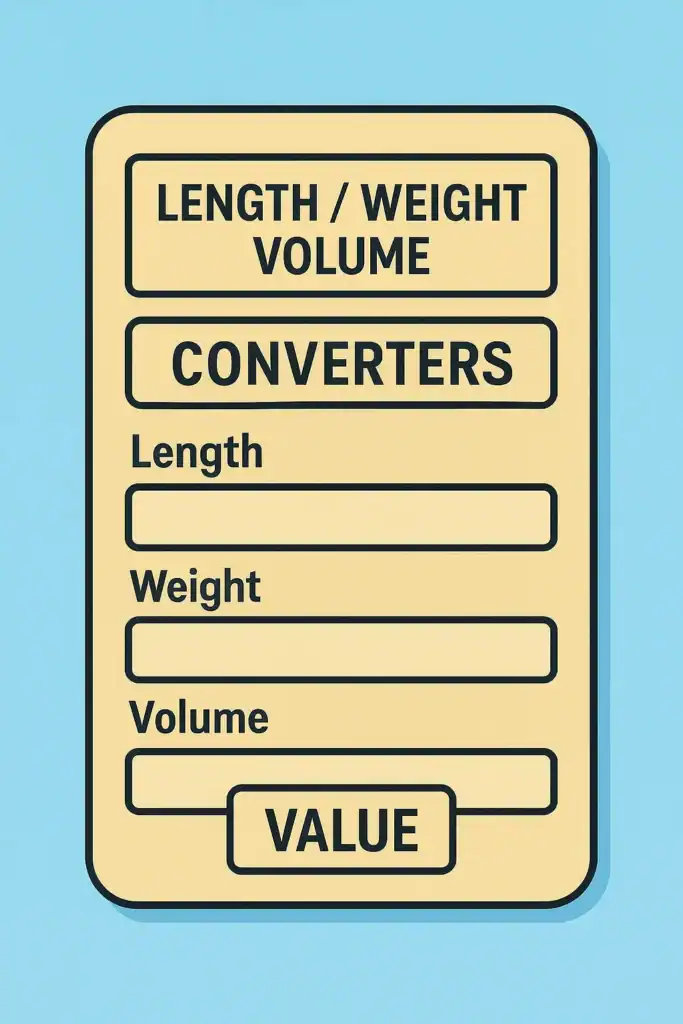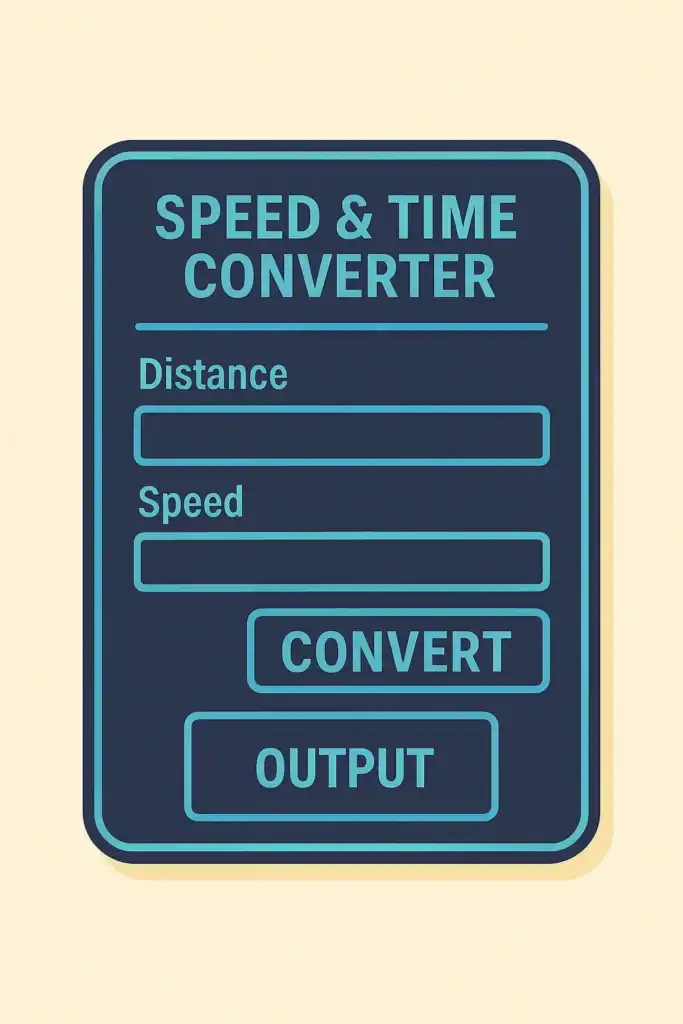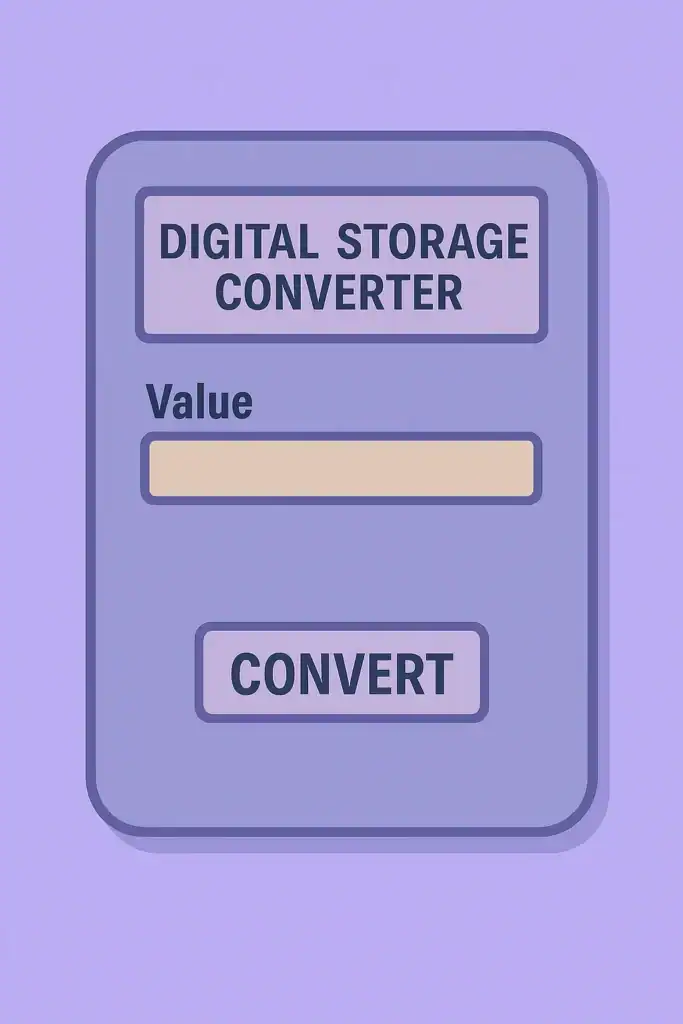Unit & Conversion Calculators
I discovered the importance of unit conversion through personal experience. Years ago, I was helping a friend repaint his living room. The paint can listed coverage in square meters. The room size? Square feet. We guessed. We ran out of paint halfway through. That awkward trip back to the store could’ve been avoided with one simple thing: Unit Conversion Calculators.
That’s what this article is really about. Unit & Conversion Calculators aren’t flashy tools, but they quietly fix everyday problems. Whether you’re measuring ingredients, tracking fitness, studying math, or just trying to make sense of numbers online, these calculators keep you from guessing and getting it wrong.
What Are Unit & Conversion Calculators?
Unit conversion calculators are digital tools that convert one unit of measurement into another using standardized mathematical formulas.
In plain terms, they help numbers make sense across different systems.
You input a value in one unit.
You select the unit you want.
The calculator gives you the correct equivalent.
That’s it.
They work across many categories, including
Length (meters, feet, inches)
Weight (kilograms, pounds)
Volume (liters, gallons)
Temperature (Celsius, Fahrenheit)
Speed, time, area, and digital storage
If you’ve ever typed “how many inches in a cm” into Google, you were already looking for a measurement conversion calculator.
A centralized place like the Unit Conversion Calculators section helps avoid scattered searches and inconsistent answers.
Why Are Unit & Conversion Calculators Important?
Here’s a question worth asking: when was the last time you worked entirely within one measurement system?
Probably never.
We live in a mixed-unit world
Recipes, study materials, fitness trackers, travel guides, and tech specs often switch between metric and imperial without warning. That’s where confusion starts.
Small mistakes don’t always stay small.
A few real-world examples:
A student converts meters to feet incorrectly and loses marks
A traveler misunderstands temperature ranges, leading to incorrect packing.
A freelancer uploads files exceeding size limits
A home baker ruins the texture of their baked goods by guessing the conversions.
I once mixed up megabytes and gigabytes while uploading a client project. The file failed. Deadline missed. Stress earned.
Unit conversion calculators exist to stop those moments before they happen.
How Unit & Conversion Calculators Actually Work (Without the Headache)
You don’t need to be a math expert, but understanding the basics builds trust.
Every conversion relies on a conversion factor.
That’s a fixed numerical relationship between two units.
For example:
1 inch = 2.54 centimeters
1 kilogram = 2.20462 pounds
1 mile = 1.60934 kilometers
A unit converter for measurements multiplies or adjusts your input using these factors. The calculator simply automates that step.
You never see the math unless you want to.
How to Use Unit & Conversion Calculators (Step-by-Step)
Using unit conversion calculators is refreshingly simple. Here’s a clear process anyone can follow.
Step 1: Identify your starting unit
Know what you already have.
Example: 75 kilograms.
Step 2: Choose the target unit
Decide what you need.
Example: pounds.
Step 3: Enter the value
Type the number into an online unit converter.
Step 4: Review the result
The converted value appears instantly.
Step 5: Double-check context
Is this for cooking, school, health, or travel? Precision matters differently in each case.
You can try this instantly with tools like
Real-Life Scenarios Where Unit Conversion Matters
Cooking and baking at home
Recipes online don’t care where you live. A European recipe may use grams. Your kitchen scale shows ounces.
Instead of guessing, a measurement conversion calculator keeps flavors consistent. Baking especially leaves no room for “close enough.”
Health and fitness tracking
Weight, height, calorie intake, and distance often mix units.
Using unit conversion calculators alongside tools like
gives you accurate, meaningful results.
Travel and driving
Speed limits, distances, and fuel efficiency vary by country.
Before road trips abroad, many travelers rely on unit conversion tools to avoid confusion and fines.
Education and learning
Students deal with unit conversions constantly in math, physics, and chemistry.
Pairing conversions with tools like
reduces errors and builds confidence.
Digital storage and technology
File sizes, bandwidth, and storage limits can be misleading.
A quick check using a digital storage converter avoids upload failures and system issues.
Benefits of Unit & Conversion Calculators
Accuracy without mental math
No formulas to memorize. No rounding errors.
Saves time
Seconds instead of minutes spent calculating manually.
Beginner-friendly
Perfect for home users, students, and non-technical audiences.
Wide coverage
From temperature to currency, from length to data size.
Always accessible
Most online unit converters work instantly on any device.
If you already use tools like the Percentage Calculator or Fraction & Ratio Calculator, unit conversion feels like a natural extension.
Limitations and Things to Keep in Mind
Even reliable unit conversion calculators have limits.
Precision varies by use case
Engineering and scientific work may need more decimal accuracy than daily tasks.
Assumptions are standardized
Some industries use specialized units or rounding rules.
Context still matters
A converted number doesn’t replace professional judgment.
For critical decisions, cross-check with trusted references like NIST or educational institutions (simulated external authority).
FAQs About Unit & Conversion Calculators
What are unit conversion calculators?
They are tools that convert values from one unit of measurement to another accurately and instantly.
Are online unit converters reliable?
Yes, reputable tools use internationally accepted formulas.
Who should use unit conversion calculators?
Beginners, students, home users, travelers, and professionals alike.
Do I need math skills?
No. The calculator handles everything.
Are these calculators free?
Most tools on your calculator hub are free to use.
Related Calculators You Might Find Useful
Once you start using unit conversion calculators, these tools often come next:
Together, they form a practical, everyday problem-solving toolkit.
Conclusion
Unit Conversion Calculators don’t try to impress you. They just work.
They remove doubt from numbers and replace guessing with clarity. Whether you’re cooking dinner, studying for exams, planning travel, or managing data, these tools quietly keep things on track.
Next time numbers don’t line up, pause for a second.
Would you rather guess or convert?
Disclaimer
The information provided by Unit & Conversion Calculators is intended for general informational purposes only. While accuracy is prioritized, results should not be used as a substitute for professional, medical, legal, or financial advice. Always consult qualified professionals for critical applications.
Author Bio / Editorial Note
Editorial Team – Your Calculator Hub
Our writers and editors specialize in practical calculator tools and real-world problem solving. Every article is reviewed for accuracy, clarity, and everyday usefulness. Learn more on our About Us page or reach us via Contact Us.
Call to Action
Try accurate, beginner-friendly unit conversion calculators now:
https://yourcalculatorhub.com/unit-conversion-calculators/





